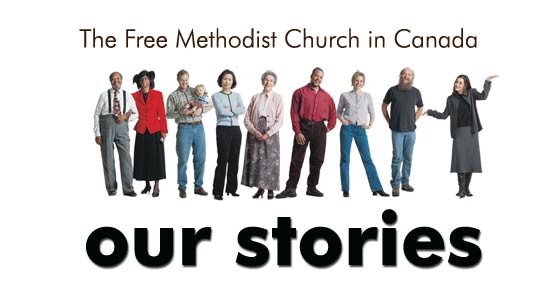I recently sat down with a pastor to talk about my new position as Stewardship Development Director. During our conversation I shared a little about my background and my personal journey regarding stewardship. When I finished he said “Thank you for sharing. Now my spirit is ready and willing to accept your ministry.”
After our meeting I spent some time thinking about his words. We are often much more receptive to hearing from someone who not only has knowledge of a subject but also has had some real world experience – both good and bad. So I thought I'd conduct an interview with myself to share a little of my story.
Why were you interested in this position?
About two years before I started as Stewardship Development Director, I felt God's prompting to consider a change in my work life. So I began to make adjustments in my business which enabled me to seek God's direction and prepare for what he had planned. I always felt a strong pull to work for a Christian ministry but I didn’t know exactly what that would be.
In August 2005 I saw the ad for my position. When I read the job description I felt like I had come home. It was perfect for me from an experience and education perspective, but even more importantly from a spiritual and ideological perspective. I applied, was interviewed and offered the job. I firmly believe that I am placed exactly where God wants me.
What education and experience do you have that relates to this position?
Well, let's start with my education. I have an economics degree from University of Waterloo and a Master of Business Administration from York University. In terms of work experience, I have over 16 years of business experience which includes seven years in the area of fundraising and stewardship. For the past 11 years I operated a management consulting business. During this time I was involved in the development and delivery of adult education curriculum. I also spent a great deal of time working with non-profits and charities in the area of marketing, public relations and event management.
Throughout your career have you ever worked for any Christian ministries?
Yes, I have. I was the Business Manager at Aldersgate College in Moose Jaw and also spent several years as the Conference Administrator for Wesley Acres and the Canada East Conference of The Free Methodist Church. I have also worked with The Wesleyan Church, the Evangelical Fellowship of Canada and Silver Lake Camp.
Tell us a bit about your responsibilities as Stewardship Development Director.
The job is split up into two major areas of responsibility. The first is stewardship development and training and the second is planned giving.
What do you mean by stewardship development and training?
There are 2,350 verses in the Bible that speak about money and possessions. The Bible gives us direction about everything including: investment diversification, debt, cosigning a loan, saving and giving. So my role is to help people learn, understand and implement the biblical principles of stewardship – God owns everything; he is our provider; we are to be faithful stewards of all that he entrusts to us. And that's not just our money and possessions. The Bible also speaks clearly about how we use our time and talents.
Why is this important enough to hire someone specifically for this area?
Well, the reality is that many of us don't understand what the Bible says about stewardship. And if we do know it, we aren't very good at putting it into practice. Statistics show there isn't any difference in how Christians and non-Christians manage money. Here are a few stats that might shed some light on why this is such an important ministry.
- money is God's number one competitor for Lordship in our lives (Matthew 6:24)
- 50% of all Canadians have less than $2,500 in savings (Statistics Canada)
- the average debt per Canadian household stands at over $70,000 (Vanier Institute of the Family)
- the number one reason couples cite for divorce is money (Statistics Canada)
- 85% of pastors feel ill-equipped to teach on biblical financial management (Barna Research)
- only 3% of Christians tithe 10% or more of their income (Barna Research)
- the average Christian gives 2.5% of their income to God's work and pays almost 10% to debt interest (Barna Research)
- 37% of regular church attendees give nothing (Barna Research)
So how do you do this?
I meet with pastors to let them know about my role and about the resources that are available for implementing a stewardship ministry. I encourage pastors to identify someone in their congregation who has a passion and is willing to take the lead in implementing a stewardship ministry. I can then train and resource that person who in turn can do the same for others within the local church. As my time and travel schedule permits, I am also available to facilitate workshops and seminars.
I've already met many people who have humbled themselves and admitted that they could be doing a better job of managing their money. So I’m also helping individuals and couples examine their financial situation and implement changes to get them on the road to financial freedom. And when I can’t physically be there myself, I am happy to help them find a Christian advisor who can help.
What about planned giving – what is this?
Many people want to invest over and above their tithe in their church, in missions, in other ministries such as youth and camps, but do not have the resources to give a cash gift today. A planned gift allows people to make a significant investment in ministries they care about through their estate, gifts of securities or life insurance, charitable annuities and other means. By working with Christian advisors, people are often surprised to find that they can structure their financial planning to include significant planned gifts without impacting their current financial position.
Have you always been a faithful steward?
I wish I could say that I have. But that is not my reality. My parents have been wonderful role models for me. They have been faithful in tithing as well as in managing the other 90% of their income for God. So I saw this from an early age – but putting it into practice myself was challenging at times.
When I started working at Aldersgate College I took a significant cut in pay from the position I left in Toronto. I was also working long hours – spending time with the students outside of my work day. I found it difficult to tithe since I was used to living on a substantially higher income, so I began to rationalize that the pay cut was really sacrificial giving since I left secular work for ministry. And I wasn't being paid for the work I did over and above my 8 hour day. Wasn't that being generous?
One day my assistant told me that we didn't have the funds to make payroll. I closed my door and began to pray for God's provision. God quickly answered my prayer, but not in the way I expected. He said "How can you expect me to bless the work of your hands when you are being disobedient?" Wow. I hadn't thought about the ramifications of my personal disobedience on this ministry. At that moment I confessed and asked forgiveness.
At Aldersgate, the mail always came in the morning. We hadn't received any funds that morning. During lunch my assistant decided to take a chance and go to the post office to check our box. She found one envelope. It contained just enough to cover what we needed for payroll that day. Now I know God doesn't always provide like that – but I think he knew I needed that concrete blessing to firmly embed his promise of provision.
I'd like to say that it was clear sailing from that day until now but that would not be true. I've had my share of bumps along the way, including credit card debts, that have thrown me off course. But as I confess and change my ways, he has been faithful in blessing my obedience.
If you would like to talk to me about my role or would like information about stewardship or planned giving, please contact me:
Joanne Bell, Stewardship Development Director
Telephone: 613.545.1335 Fax: 613.545.1606
Email: bellj@fmc-canada.org
skip to main |
skip to sidebar


Blog Archive
-
▼
2006
(32)
-
▼
July
(9)
- Student Ministries - Bible Quizzing
- Destination: Accra, Ghana
- FM Helping Hands in Katrina-ravaged Mississippi
- Rob Clements Book Picks
- Meet Joanne Bell - Stewardship Development Director
- How our stories change lives
- I'm with Him
- Forget about inviting Him without His Bride
- Japanese woman travels to Canada to be baptized
-
▼
July
(9)
Links
About The Free Methodist Church in Canada
- Our Ministry Centre is located in
- Mississauga, Ontario, Canada
- The Free Methodist Church is a movement of Christian congregations all across our country that are committed to sharing the good news of faith in Jesus Christ and encouraging believers into a life of ongoing transformation that impacts our families, our communities and our nation.

No comments:
Post a Comment